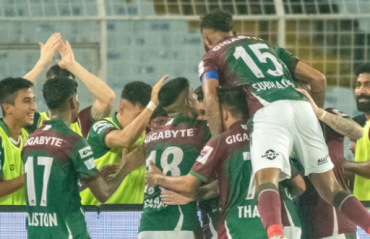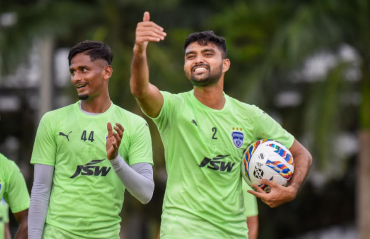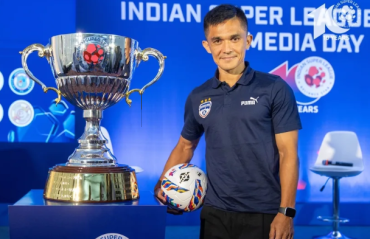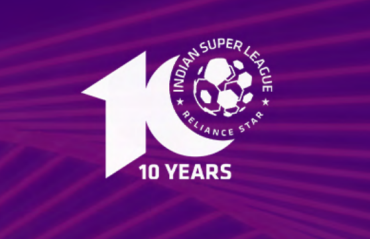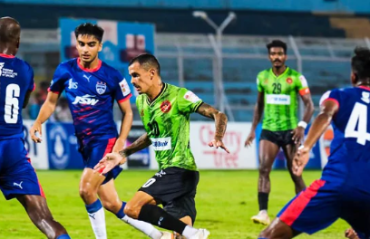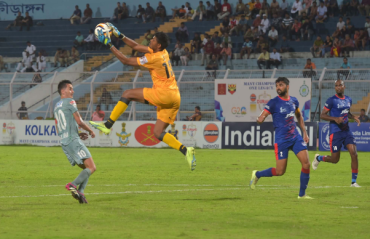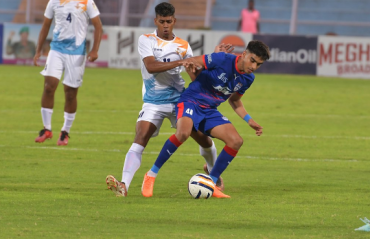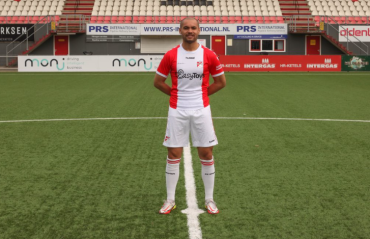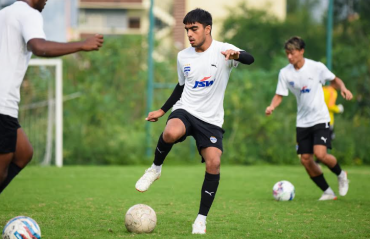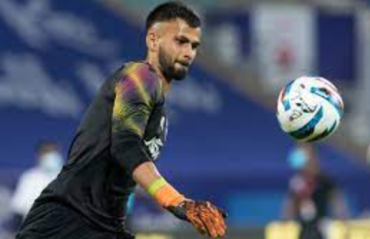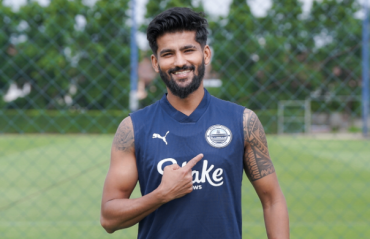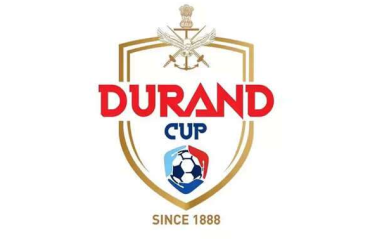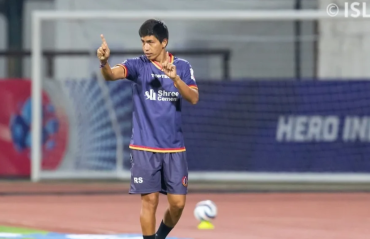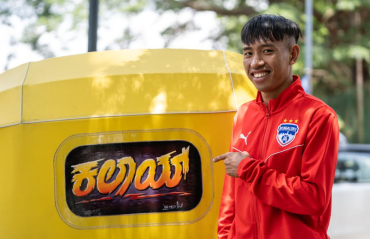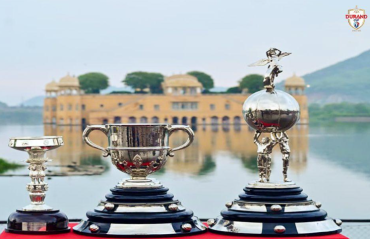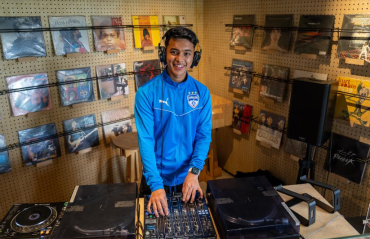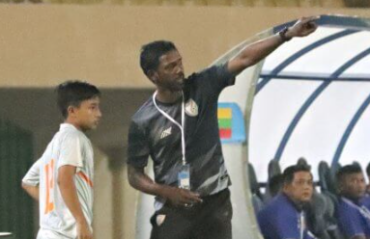#TFGInterview - Bengaluru FC CEO Mandar Tamhane on entering women's football, youth team challenges & evolution of Indian football
- By Chiranjit Ojha

- September 27, 2021
BENGALURU FC ARE going through an interesting phase.
The club is entering its ninth season, riding on the very first two year trophyless phase at the national level in their history. They have a new head coach who is just settling in and they have underperformed in the AFC Cup 2020 and 2021.
At the same time, their youth teams are doing better than ever. Their residential academy is bringing up players who regularly challenge for the title in local league, and their reserve side has emerged as one of the chief title challengers in the Durand Cup.
And at this juncture they have announced that they're finally fielding teams in women's football, starting with the Under-11, Under-13 and Under-15 levels.
The vibe one gets from the Blues is that of a biryani on the oven. The enclosed, smoking cauldron smells great but it's not fully cooked yet.
To get more details, TFG spoke to Bengaluru FC CEO Mr Mandar Tamhane. First and foremost, he explained why the club is launching junior teams first when it comes to women's football,
"We've been wanting to be involved in Indian women's football since the beginning. Obviously it's always easy to start with the first team, or the senior team, so to say. But we just feel that right now, with the current landscape of women's football in India in terms of competition, which is obviously the IWL, I think it's a very short period of time, which is probably a month or month and a half. You prepare for it a couple of months, so there's a three to three and a half month window in terms of your contribution to women's football. And I don't think from our side we'll be able to do justice to the development aspect of it, which for us as a club is very important. Whatever we do with football, we're contributing to the development of Indian football... if we are getting involved, starting with the age group teams will help us build strong foundations. So I thought that was the right approach for us to do."
— Bengaluru FC (@bengalurufc) September 17, 2021
In 2019, the Karnataka Women's League was launched. This is something, Mr Tamhane said, was fitting for BFC's plans,
"In Bangalore we have got a pretty good setup in terms of women's football. The Karnataka State Football Association (KSFA) or the Bangalore District Football Association (BDFA) have got the Super Division women's league as well as the Division A. So we feel like maybe we can start off with the Division A with our U-15 girls participating, and slowly have a progression with the U-13 and U-11 girls, who are also eventually going forward to U-18 and then obviously the senior women's team. That is something we have taken a call on. Also in Bangalore we have a lot of community leagues which will help us give adequate level of competition to the girls. So until and unless you give them the competition, just training would not do justice to what you want to produce with them in terms of the players' progression and the players' development."
But for the fans who want to see Bengaluru FC challenging for the national league title in women's football like they do in the men's game, that's something they will have to wait for a bit longer. According to Mr Tamhane,
"IWL obviously we can also go to directly, in terms of how the other clubs are doing, by fulfilling certain criterias set up by the Federation. But that's something we'd like to do in time, not jump into it. Because as I mentioned, if we're doing something for women's football it will be at par with what we're doing in men's football. We'd like to provide proper accomodation for the girls, have a proper pre-season, play across at least 8-9 months out of which we'll have at least 5-6 months of competition. We want it to be a meaningful contribution from our side."
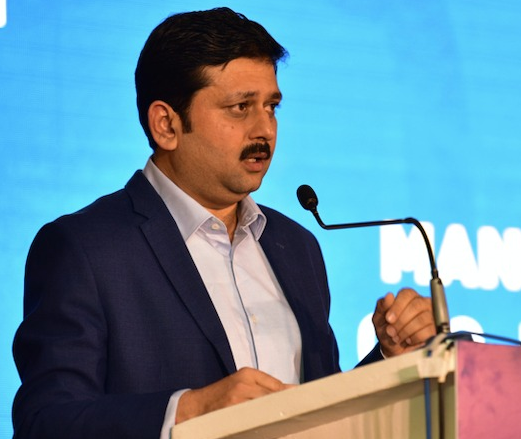
Of course, one could make a different calculation. Bengaluru FC will have a team in the Karnataka Women's League. If they progress to the top league there, and win it, they will automatically be eligible for an IWL entry. So, technically, it can be said that BFC have already joined the race that leads to IWL.
But hearing that, Mr Tamhane was quick to put all speculation to bed,
"I wouldn't look at it like that... to take forward your thought process, if we play in A division, get promoted to the Super Division, win the Super Division, I'm not 100% obligated to play the IWL. I can say I don't want to play the IWL... I think we will take that next step when we feel we are ready."
So, when can BFC fans expect to see Bengaluru FC's women's team in the battle to be the Champions of India? The CEO elaborated,
"We have to see how the ecosystem is developing, right? If we're going to continue doing women's football this way, like we still have a one and a half month league, then I don't think that we as a club are in a position to do a meaningful contribution. Because if we assemble the squad two months before IWL, then play, and after three and a half months we're done, then what do you do after that period is over? Development is a continuous process. I feel we will be ready for it once the ecosystem evolves itself. In January we have the Women's Asian Cup then of course the U-17 World Cup, so I think a lot of things are in the pipeline. The AIFF is also taking a lot of steps towards growing women's football, the government as well with intiiatives like Khelo India. So I think it's time for clubs like ourselves to also join hands and make meaningful contributions to take that next step and help women's football grow in India."
Through initial trials to age-group teams, we're putting the pieces together for something we hold close to our hearts - #BFCWomen.
— Bengaluru FC (@bengalurufc) September 17, 2021
She's Blue, She's Bengaluru. ????
Stay tuned for more! #WeAreBFC pic.twitter.com/7Vtu4jyEw3
He was, however, keen to make it clear that he did appreciate the IWL in its present form, and the clubs that play in it, while asking for improvements in the tournament's format,
"I think whatever the clubs are currently doing, we should applaud them for it for making that effort. We should take note of each and every club that's taking part in the IWL despite their limitations, as you mentioned. But at the end of the day we have a certain vision that we feel we can contribute in terms of development. So if we are going to look at a longer league, even a 3 month or 4 month league, then that is something I think is good to start off with."
Entering women's football, Mr Tamhane revealed, is something that has been in the works at Bengaluru FC for quite a few years now,
"I remember back in 2014 or 2015 when we had initiated this dialogue with AIFF of starting the women's league, we had this kind of a meeting in the Football House in Delhi where most of the clubs attended. We obviously were part of the I-League, so we were part of that particular meeting where we were very keen to be participating in such a league. If it had started at that time, we could have participated. Then obviously the AIFF did it, but the format was different. The way you signed the players was different because there were certain institutional teams that were playing which had the players contracted. So we were not able to take those players, only certain players would have been available et cetera. I think there were a lot of limitations at that time, with those insititutions who had employed those players. So it was a bit of a nascent stage for us to get into it. Today, if we are to get into IWL, I want to have at least the opportunity to sign the best women players in the country. I don't want this situation where you cannot sign so many of the top players because they've already signed with some institutions... then what can we do? Maybe we can create our own players. We can start at the junior level. That's how we are approaching this. This way we feel we can make an impact not just in our club but going forward, perhaps, in Indian football."
The Blues had a massive turnout for selections to its U11, U13 and U15 Girls teams, at the Bangalore Football Stadium, on Saturday.#WeAreBFC #BFCWomen pic.twitter.com/FjNt5K29kJ
— Bengaluru FC (@bengalurufc) September 26, 2021
Asked if the introduction of the AFC Women's Club Championship, where Gokulam Kerala FC will represent India as the reigning IWL champions, provided added incentive for Bengaluru FC to enter the fray, he replied,
"I think it's a big incentive not just for Bengaluru FC but any club that's participating in the IWL, to be able to represent the nation in Asia if you win it. I think it's a big, big step. But to be honest with you, this is not what made us think about participating in women's football. We have been considering and preparing for this for a while. We probably got delayed a year and a half by the COVID-19 situation that we are in... but I think now is the right time for us to try and execute it. Because it's one thing ideating certain things, and then the biggest challenge for us as always is to execute it... at the end of the day you can't just snap a finger and have a team ready, it takes time. And when you have a bottom-up approach, the more time you take to have your foundations right, I think in the longer run that will be beneficial for us to have that meaningful impact."
Of course, outside women's football, Bengaluru FC have been evolving in men's football as well. Since the launch of their residential academy in Bellary, the club has increased its focus on talent development. Since then they have also introduced the reserve squad. When TFG asked if Mr Tamhane was happy with the results produced by the club's youth development system so far, he said,
"If you had asked this question two or three years back I would have said, definitely satisfied. Because for us, when we started off with the youth programme and the residential academy, we had a certain thought process in mind, which was obviously the player progression. But after 2-3 years we realised that we had the U-18 and then the senior team, and there was definitely a big gap between them. So we felt that a reserve team was necessary to bridge the gap, to fill that vacuum, so we established the reserve side. And now the reserve team is helping us have an impact where some of our academy players are graduating through the reserve team to the senior team. And we are also making our talent pool bigger. Initially we were looking at our first team as having 25 to 28 players. Now we are looking at the first team collectively as the senior team and the reserve team which is a pool of around 40 to 45 players."
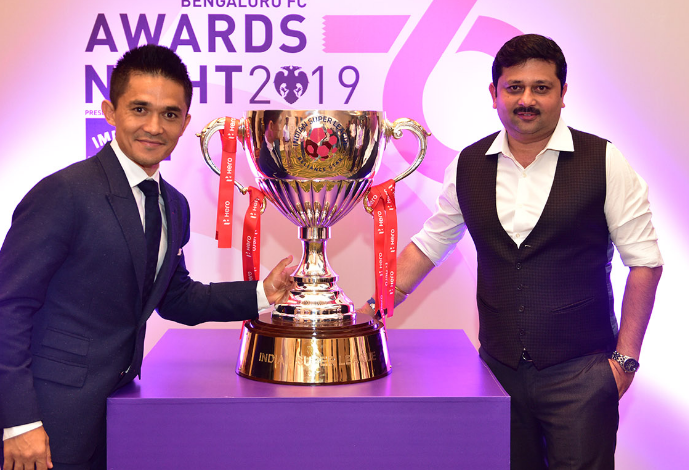
One issue that the BFC CEO wanted to put a lot of emphasis on was the number of matches available per season in youth football. He said,
"In our reserve team we have 10 or 12 players who are above 18, and the remaining are Under-18. Again, the thought process was to give exposure to the U-18 boys who were playing in the Bengaluru league plus the U-18 Youth League when it was happening. Of course we haven't had the Youth Leagues during the pandemic but hopefully we'll have them again soon. This setup helps us give them at least 40 to 45 competitive matches in the season. I feel when the children play these numbers of games, their chances of developing into a first team player for Bengaluru FC or the youth national teams or the senior national team increase. That's what we felt, regarding our player development efforts. Now, yes, we are a little bit satisfied with the effects... but I think there's still more that we can do. I think there's a lot of things we can better ourselves in, to make it easier for these children to grow and improve. Because the challenges we are facing in the U-13 and U-15 level is that we are only giving around 10 to 12 competitive matches, and that's through the Youth I-League. There we are playing zonal legs, which includes Bengaluru, Chennai and maybe some surrounding states. Then we've got the academy tournaments, where some soccer schools with pay-and-play programmes participate and lose 12-0, 18-0 or 20-0. Which is not good. It's not good for us, nor for the children playing for the other team. Because those kids get really depressed and you don't want that. You want children to enjoy football, at that age. And then our players feel like they're big stars, winning with high margins like that. That's not good for their development either."
So what could be the solution? He said,
"We have to create competition. Whether it's through our own efforts or through the state association or national federation. We are trying on our own to see how best we can create a JSW Cup, youth cup, which we can do in Bellary. There we can have maybe RoundGlass Punjab or Reliance Youth Academy, Tata Football Academy, FC Goa, Dempo et cetera try and have a competition. We did it a couple of years back with SESA Football Academy in Goa for the U-15 as well as the U-18 sides. So as various clubs and academies who are serious about youth development I think we need to come together. And hopefully going forward perhaps even the Indian Super League can have something like this. We're talking about a developmental league now, so hopefully that's the first step. Then obviously we go into the other age groups also. With time we will have something that helps not just clubs like us but also support the national team. The more competition we have at the younger levels, the more we can have players who can play at the senior level and contribute to the national team."
An ISL developmental league, and the JSW Cup he described, would of course be a major addition to have on top of the existing men's youth leagues run by AIFF. But would Bengaluru FC organize JSW Cup-like tournaments for junior teams in women's football as well? Mr Tamhane answered,
"With time we will have to do that. If you ask me if we're going to immediately do it in the next 6 months, I don't think we are ready for it now. But with time, if we feel the competition that we have to give to our womens' team is not there, then maybe that is something which we definitely will have to look into. But this will have to come step by step, as and when necessary. The surroundings are evolving, we are also evolving. Other stakeholders like the KSFA and AIFF are also evolving... it's very easy for somebody to say that this needs to be started. But this needs to be sustainable. This needs to be taking your thoughts on developing football in the right direction. So, with time, I think these things will come into women's football as well."
BFC Soccer Schools pair Amina and Rheanna were out to impress the coaches during the girls trials, at the Bangalore Football Stadium.#WeAreBFC #BFCWomen pic.twitter.com/8vc0IrwcJT
— Bengaluru FC (@bengalurufc) September 26, 2021
Of course, for Bengaluru FC, the spotlight at present is on the team that's playing in the Durand Cup, having reached the semi-finals with praiseworthy performances. When asked if he looked at the young squad as a legitimate silverware prospect for the club, Mr Tamhane quickly dismissed the idea,
"No I don't think so. To be honset, this is not something we are looking at as an end product from this group. If it happens, that's great. But it's about how many players from this squad will be a part of the first team going forward, regular starters or part of the squad. For us that's what is important. Because winning a trophy, even a Durand Cup, leaves us asking, what's next? This is just about creating a pathway so we can have players coming into the first team. That is for us the part that we want to focus on right now. We have the likes of Siva Sakhti, or Bidyasagar, or Roshan as you mentioned, Damaitphang Lyngdoh who is a good kid, Thoi Singh who is a 17 year old boy, if they can progress further into our first team, that is something we are looking forward to."
The Blues go marching on! Here are the highlights from the Bengaluru FC's comeback win over Army Green in the quarterfinals of the #DurandCup2021. #WeAreBFC #BFCAG
— Bengaluru FC (@bengalurufc) September 26, 2021
pic.twitter.com/O2VUm2qfU0
Instead, he was thinking more about what his players would be doing for the rest of the 2021-22 season,
"The squad we have at U-18 and reserve is bigger than our Indian Super League squad. We've got 4-5 games in Durand Cup, then we're going into the BDFA Super Division League towards the end of October. There could be a good possibility of having a developmental league, maybe in, say, February or March. That, again, will give us another 10 to 14 games. So we are looking at a good 35-40 games for these kids. Which next season will help us bring more kids coming into the first team or having more chances for the first team coaches, Naushad Moosa et cetera to have a look at these boys. So this is what we have been aspiring to do in the past 3-4 years with the reserve team. This is the reason we had Naushad Moosa as a part of the first team coaching staff, in youth development as well as the head coach of the reserve team. We were able to put this process in place and now we can take advantage of this system in producing our final product, which is players progressing to the first team. So winning trophies will never be the sole purpose of these youth teams... I tell this to our coaches also, it's not about winning. It's about progressing the players. If we have the processes in place for developing players, results like the silverware we talk about are bound to come. But if we focus just on the silverware, then we will lose focus on players' development."
So what would be the ideal number for a developmental team to play in a season? Mr Tamhane said,
"The more the better. When we started the reserve team, the first season we clocked 26 games. In the second year we clocked 33 games. In the third we missed out on a couple of 2nd Division matches which had to be stopped due to the pandemic and we were able to clock 41 games, the highest we were able to do. Last year obviously because of the pandemic we didn't have much competition except BDFA and a few tournaments in Goa as practice matches, so again we were able to clock around 24-25 games. But the idea is, if we get the opportunity to play around 50 games, why not? The more matches these children play, the more minutes they get, the more opportunities for them to get experience and grow. And when you have 16-17 year olds playing and getting exposed to competitions with a higher age group kids, you may find them physically weak at times, but in the longer run they will improve a lot faster when they come to the right age at the senior level."
SIIUUUUUUUU!!! ??#WeAreBFC #BFCAG pic.twitter.com/gWzDYQD74o
— Bengaluru FC (@bengalurufc) September 25, 2021
Of course, not having enough matches is something even senior teams are suffering from in Indian football, especially during the pandemic. Not having enough competitive matches is a factor many fans have pointed out as an explanation of Indian clubs, and the national team, underperforming at the international level in the last year or two. When asked if he believed the first team wasn't getting enough games, Mr Tamhane agreed,
"To be honest, yes. And we have to be honest about it, instead of mincing words. More number of matches are needed for our senior team players. Players who are playing in the national team, I mean, if they're going to get just 22 games, in the overall scheme of things we all know it's not good. But it's easy to say, it's not good. In the given conditions, given limitations and I won't say problems but given circumstances that we are in, it's not easy to do it. But hopefully with time and with the kind of evolving that has happened in Indian football, I think in the near future we will have a longer format where we will be able to play a larger number of games. Of course the pandemic has caused a hindrance because we have a mandate from the AFC to have a minimum number of games to be played in terms of the teams that are participating in the Indian Super League for us to have that spot in the AFC Champions League. But of course due to the pandemic they relaxed it. So of course, AIFF and ISL are doing their job and as clubs we have to do our job. From the 2022-23 season I think we will have a higher number of games, not to the extent of 40 or 50 obviously, but more than what we are seeing right now."
But would he attribute lack of matches as a reason why Bengaluru FC were unable to progress beyond the AFC Cup 2021 group stage? This time, he didn't agree,
"No I don't think so, if we are talking about Bengaluru FC. Obviously we've had a lot of changes, with a new head coach and a lot of players coming in et cetera. I think we need time, because we can't suddenly make things happen. We are in the right process. We are happy with the way things went, we are very happy with the way the AFC Cup also went... we are taking big steps, I think we are preparing well also now. So hopefully we are able to show that in the coming games."
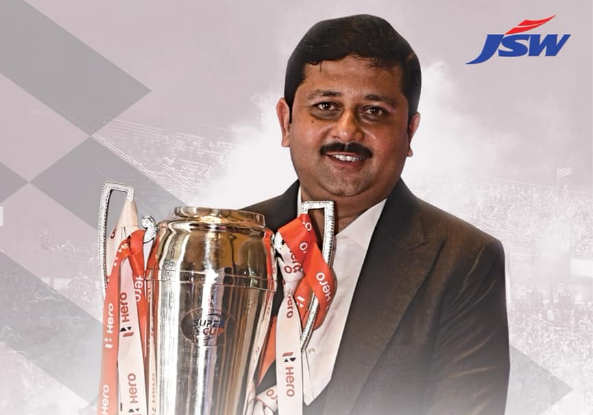
When asked if BFC being trophyless at the national level for two years had raised the stakes for the club this season, he provided a rather diplomatic answer,
"I think for us it's always been a learning process, right from year one to year nine that we're in for the club. So for us we're always learning. When we are winning, or when we did not win in the last year or two. I think what we're happy about is that we've stuck to a certain process. We did justice to the process. There were certain things that, obviously, could have been done better. As long as we're able to identify that and make those changes for things to get better, I think we are happy with the way we are progressing. And I think results will come. The way we think, the way we plan, the way we are able to execute what we are planning, I think we should be able to step up our performance in the coming matches also."
There is, however, one hopeful stat for BFC fans: the only two seasons that the Blues have not played in Asia - which are 2013-14 and 2018-19 - both resulted in them winning the league they were in. But when this was mentioned to Mr Tamhane, he wasn't going to take it as a sign of things to come,
"I don't really like to connect things like these. Every season is different, the conditions are different. Obviously we want to win the league, there's no question about that. But as to whether we did not have any Asian football, or we woke up from the right side of the bed or we tied the right shoelaces first, that's something we don't believe in. We just believe that we have to help Indian football grow. Whatever decision we take are in that direction. If our club does well, Indian football does well and if Indian football does well all the clubs will do well. So that's something we believe in strongly... Obviously those efforts we take were not reflected in the results the past two seasons. Hopefully this year we will see their effects on our results also."
But what the sign of things to come he did take seriously was the restructuring of Indian football currently in progress, with the ISL adopting promotion-relegation soon. The changes coincided with JSW Director of Sports Parth Jindal's public comments about the club facing financial losses while playing in ISL, and his support for an open league system in Indian football. When asked how he thought the ongoing changes would impact the club, Mr Tamhane said,
"I think primarily we have to make it more robust, for sure, the financial situation of not just Bengaluru FC but every club that's participating. I think the concerned people have taken note of it, they have been making a lot of efforts towards that direction. It's not easy. Because it's easy to be always on the other side and say, this thing is not done and this is easy to do. But when you try to do it practically there are challenges, which I'm pretty sure everyone is aware of. And I think in the next year or two we will see that getting better. Because I think a lot of work is being done towards that, in that direction. We will see some results soon. I am hopeful about it."
With so many changes coming to Indian football, as well as Bengaluru FC, perhaps the biggest takeaway for the fans would be to look at the positives and be hopeful as well.
Get the latest in the world of Sports, Teams, and Players! Free Delivery to your Inbox.









